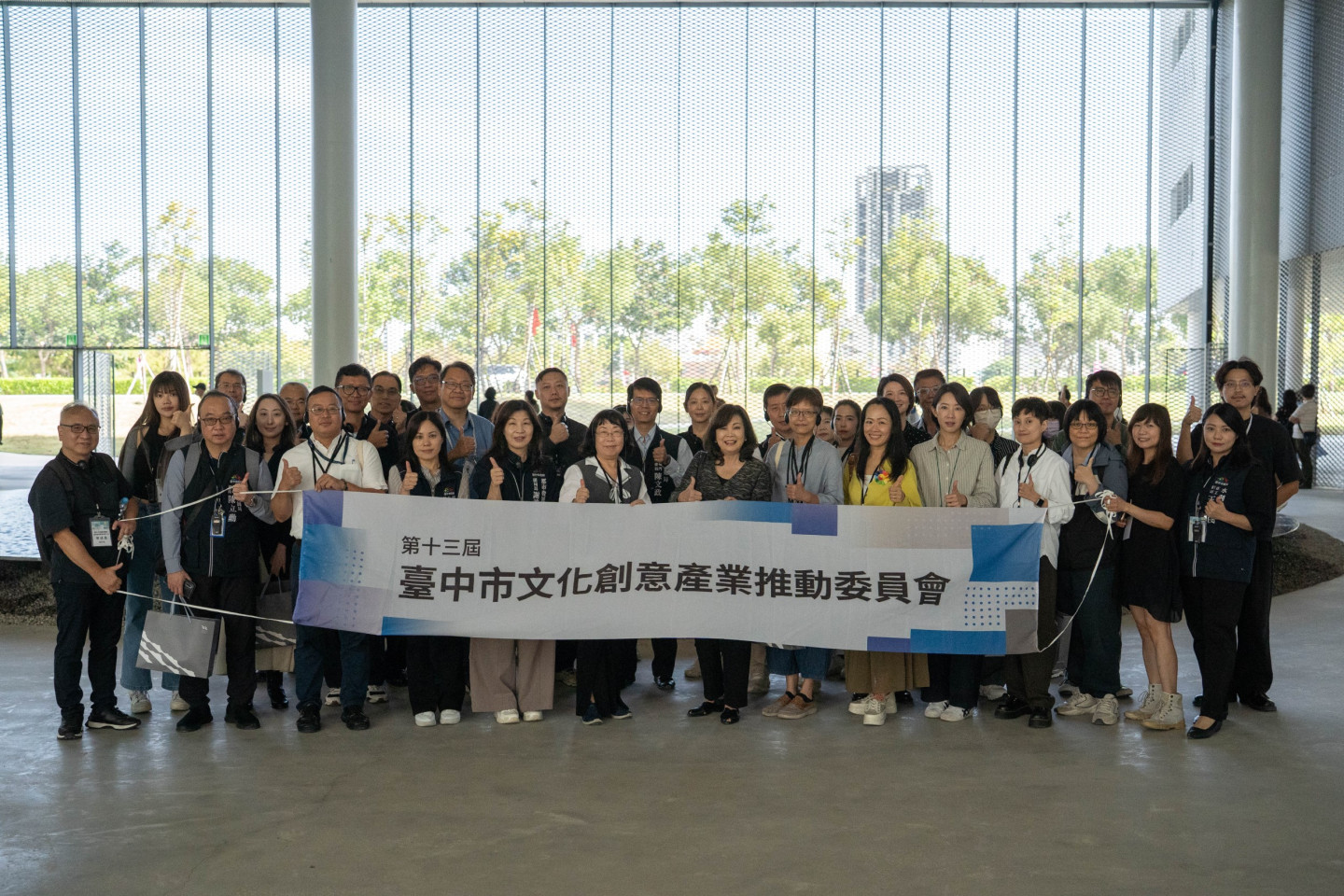Cultural ESG Evolution: City Government Joins Hands with Industry, Government, and Arts to Build Sustainable Collaboration
Lily Chang|Taichung City Government Global Information Network

The Taichung City Cultural and Creative Industries Promotion Committee visited the Taichung Green Museum of Art during its trial operation, showcasing its impressive architectural works.
The Taichung City Government held a special meeting today (31st) at the Taichung Green Museum, which just started trial operation on October 28th, to convene the Taichung City Cultural and Creative Industries Promotion Committee. The meeting discussed the current status of the city government's promotion of cultural ESG and the results of the development of cultural and creative clusters. Through diverse cooperation models, the city government aims to deepen the influence of cultural ESG, work with local enterprises to jointly create a happy and livable city, and invited the city government's Water Resources Bureau to share successful cases of "water culture and environmental education" to jointly promote water culture and environmental education and implement the concept of sustainability.
Taichung City Government Deputy Secretary-General Chang Ta-chun stated that promoting Cultural ESG requires the joint efforts of industry, government, and the arts. Many enterprises in Taichung strongly support the concept of Cultural ESG and put it into practice. For example, Robson Corporation invested over NT$120 million to work with the city government to create the most beautiful ecological landscape library in Taichung, the "Robson Library," creating a sustainable reading space. This year's Central Taiwan Lantern Festival brought together more than 60 enterprises and organizations, including Longbao Construction and Taichung Lecheng Temple Foundation, to participate enthusiastically. They also combined local precision mechanical technology to create the only mobile main lantern in Taiwan, showcasing the integration and innovation of Taichung's culture and technology.
Director of the Cultural Affairs Bureau, Chen Chia-chun, explained that promoting Cultural ESG and guiding enterprises to support the cultural and creative industries is one of the Ministry of Culture's key policies in recent years. This aims to assist cultural industry teams in securing partnerships with businesses and creating more sustainable cooperation models. Following the "Cultural ESG Seminar" held in August, the Cultural Affairs Bureau subsequently held introductory and advanced "Cultural ESG Proposal Empowerment Workshops" on October 9th and 17th, respectively. Several industry and academic experts were invited, including Professor Shih Yi-huan from the Department of Cultural and Creative Industries Design and Operations at National Taichung University of Education, Professor Tung Tse-ping from the Department of Cultural and Creative Industries Management at National Taipei University of Education, Deputy General Manager Chuang Yu-ting from Deloitte Taiwan Sustainable Development and Risk Management Consulting Co., Ltd., and Director Li Yu-fang from the ESG for Culture Impact Center at the Taiwan Creative Content Agency. They used their practical experience and professional knowledge to guide cultural industry teams in strengthening their proposal content, mastering presentation skills and business matching strategies, hoping to connect artistic creation with corporate resources and provide feedback to the teams. The Cultural Affairs Bureau will continue to focus on the core concept of Cultural ESG and actively assist in exchanges between enterprises and cultural industry teams, so that more outstanding creations can be seen and supported.
"Central government ministries have established a sound mechanism for the operation of corporate ESG resources, including funding, investment deduction, and cross-domain collaboration. The workshop provides practical training for Taichung's cultural industry teams, and its highlights are promising," said Professor Shih Yi-huan. Professor Tung Tse-ping pointed out that "cultural ESG is not only a global trend but also an important engine for promoting sustainable development." The training workshop was held at the "Heart Valley Sustainable Education Park." Wen Pei-pei, the park's founder and CEO, and also a member of the Cultural and Creative Industries Promotion Committee, personally participated in the course. She stated that this workshop allowed everyone to gain a deeper understanding of the value and practical methods of cultural ESG. The course combined theoretical systems with action orientation, laying a solid foundation for promoting cultural sustainability and social impact in the future. Lin Li-feng, the leader of the Songjue Jazz Orchestra, also shared that the course content was solid and inspired many practical ideas, leaving everyone wanting more and looking forward to more related resources and training opportunities in the future.
The Cultural Affairs Bureau further explained that the city government will leverage the convening of the Cultural and Creative Industries Promotion Committee to integrate resources from various departments and agencies, continuously promote Cultural ESG, and organize related activities. This will foster greater cross-sectoral cooperation and sustainable development, enabling industry, government, and the arts to work together to create a better future. The city hopes to combine cultural energy with corporate resources to build Taichung into a cultural city that is creative, resilient, and sustainable.

 MENUCLOSE
MENUCLOSE